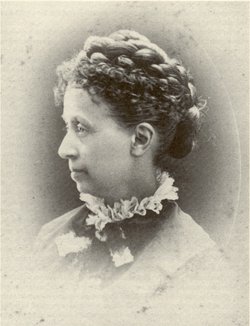Julia Wilbur facts for kids
Quick facts for kids
Julia Ann Wilbur
|
|
|---|---|
 |
|
| Born | August 8, 1815 |
| Died | June 6, 1895 (aged 79) |
| Occupation |
|
| Parent(s) |
|
Julia Wilbur (August 8, 1815 – June 6, 1895) was a Quaker woman who fought to end slavery (an abolitionist) and gain voting rights for women (a suffragist). She wrote a detailed diary during the Civil War. This diary tells us about important historical events and everyday life during that time. Julia Wilbur also worked with Susan B. Anthony to help women get the right to vote. She was an early member and later secretary of the Rochester Ladies' Anti-Slavery Society (RLASS). This group helped pay for Frederick Douglass' newspaper, which also fought against slavery.
Contents
Early Life and Education
Julia Ann Wilbur was born on August 8, 1815, in Milan, New York. She was the third child of Stephen and Mary Wilbur. From 1829 to 1831, she went to Nine Partners Boarding School in Dutchess County, New York. Her mother passed away in 1835. Julia stayed home to help raise her younger brothers and sisters. In 1844, she moved to Rochester, New York, to become a teacher.
Helping During the Civil War
In 1862, the Rochester Ladies' Anti-Slavery Society (RLASS) asked Julia Wilbur for help. They wanted her to work with "contrabands." These were enslaved people who had escaped to areas controlled by the Union Army during the Civil War. Julia wrote in her diary that they were looking for "a teacher to go South."
She agreed to help and traveled to Washington, D.C., in October 1862. She first planned to stay in the capital city. However, a group called the National Freedmen's Relief Association asked her to move. They wanted her to go to Alexandria, Virginia, which the Union Army had taken over. There, she would work as a relief agent, helping people directly, instead of just teaching.
Julia Wilbur worked in Alexandria from November 1862 to February 1865. She worked hard to get better housing and health care for the freed people. She also asked groups in the North to send clothes and other supplies. She gave these items out from a "clothing room" in a house on Washington Street. While doing this, she became good friends with Harriet Jacobs. Harriet Jacobs was also an important writer and abolitionist.
After the War: Reconstruction
After the Civil War ended, Julia Wilbur worked for the Freedmen's Bureau. This organization helped formerly enslaved people. The Rochester Ladies' Anti-Slavery Society still helped fund her work. Julia was a "visiting agent," giving out tickets for fuel, food, and other things people needed.
She saw that there was much more need than help available. She also noticed that many people were starting to turn against the efforts to rebuild the South and help freed people. Julia also made trips to Richmond and Fredericksburg. She brought supplies and reported on how the formerly enslaved people were living.
Fighting for Women's Votes
Before the Civil War, Julia Wilbur spent more time fighting against slavery. But she always strongly believed that women should have equal rights. This included economic, social, and political rights.
In 1869, she and five other women planned to register to vote in local elections in Washington, D.C. They gave a letter to the election judges. Part of the letter said, "We know that it is unusual for those of our sex to make such a request. We do so because we believe ourselves entitled to the franchise." The judges did not let them register to vote. However, their effort was reported in newspapers, bringing attention to the cause.
Later Years and Legacy
Julia Wilbur realized that her work with the Freedmen's Bureau was ending. So, she looked for a job with the United States government. She was part of the first group of women to work for the government. She got a job as a clerk in the Patent Office. She worked there until she was almost 80 years old.
Her obituary (a notice of her death) said she died from "influenza and results." It also noted that "for many years she engaged in active partisan labor for the cause of freedom." Julia Wilbur is buried in her family's burial plot in Avon, New York.
See also
 In Spanish: Julia Wilbur para niños
In Spanish: Julia Wilbur para niños

